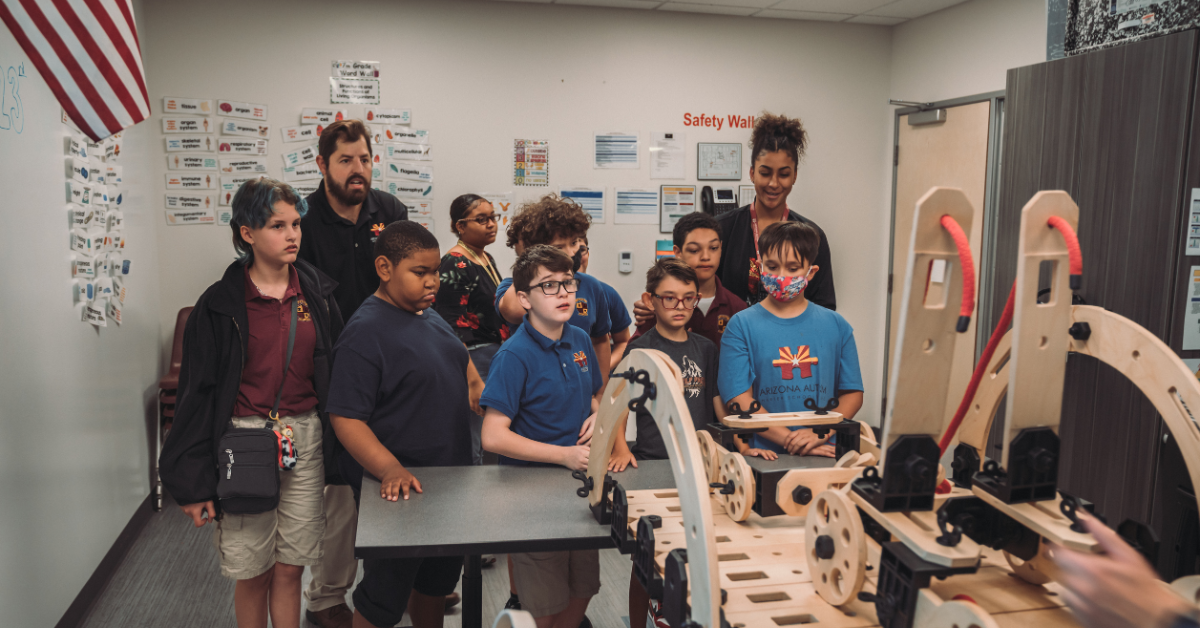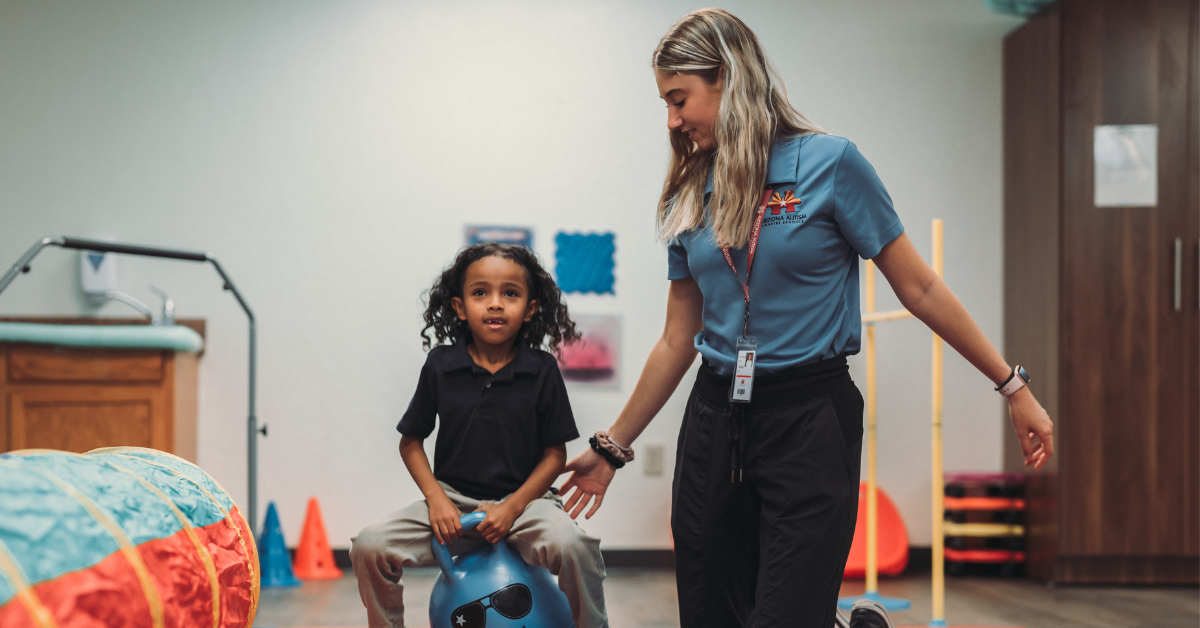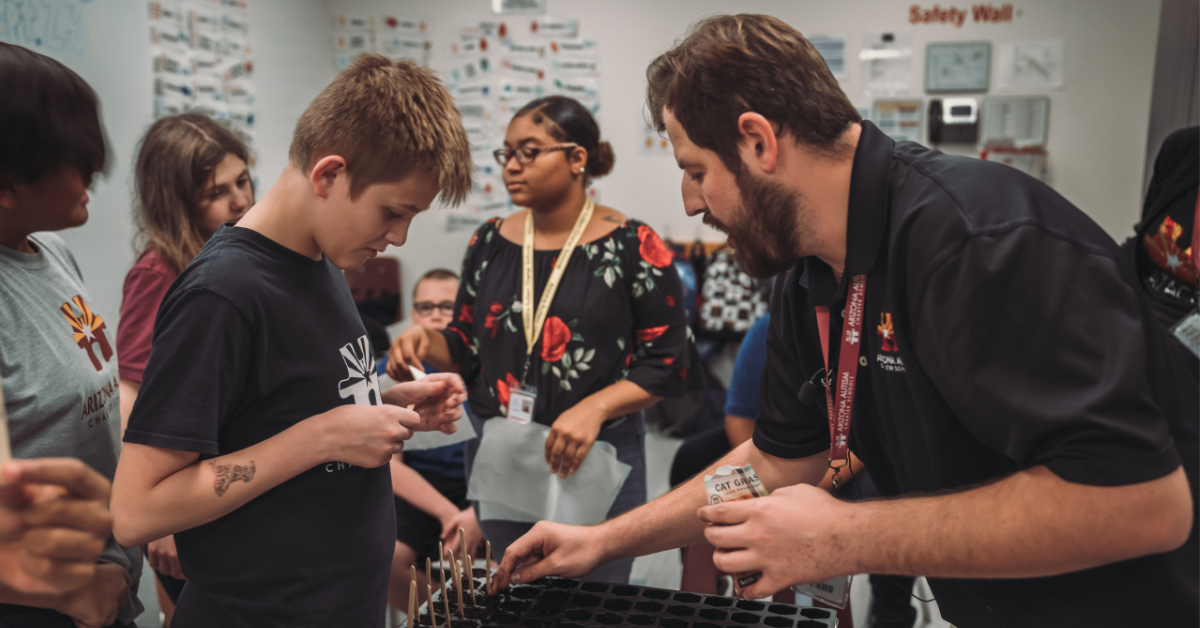
“It’s very easy for a child on the spectrum, even one with the mildest case of autism, to get lost and overwhelmed in the mainstream public school system,” says Kerrie Mallory-Thompson.
That’s why, when it was time to enroll her son, Conor, in school, she knew she wanted him to attend Arizona Autism Charter School (AZACS) in Phoenix, the first and only autism-focused community charter in the Southwest.
Conor was born nonverbal and with severe social and sensory issues. Now age 13, he just lost his nonverbal status and has become much more open to other people and experiences.
“Conor has made a tremendous amount of progress in the last couple of years. Just the social aspect, in general, has been huge,” she says. “Being on campus and around friends and staff who help and encourage him has made a difference. If he had been in a large mainstream school, he wouldn’t be as successful as he is today.”
Thompson credits her son’s progress to the support he receives from the staff at AZACS — and especially to the hard work and vision of its founder, Diana Diaz-Harrison.
To learn more about AZACS, watch this video:
Diana Diaz-Harrison never imagined that her life would take the direction that it did. A former teacher in California, she transitioned into broadcasting and worked in Spanish-language media. But when her son, Sammy, was diagnosed with autism, she immersed herself into his care and the educational best practices for the disorder. Like many parents, she struggled to find affordable schooling that met his needs.
“I did pay for private school for a couple of years, but that was not sustainable,” she recalls.
“I learned that there were autism charters in other states, and I thought, ‘You know, somebody here in Arizona should start a tuition-free, autism charter in the state.’ After a lot of knocking on doors, I realized that that person had to be me.”
In 2014, Diaz-Harrison established the first AZACS campus for 90 students in grades K-5. Today, the school has expanded to more than 700 students across four campuses, including a high school and an online component. She expects that number to increase to 1,000 students for the 2023-24 academic year. AZACS also will be opening a high school in Tucson in fall 2023.

Arizona is a leader in school choice, thanks to former Gov. Doug Ducey, who signed some of the most expansive educational options into law. His support of AZACS was common knowledge.
“I’m greatly inspired by the work the Arizona Autism Charter School has done over the last decade. Diana’s act of true, unconditional love for her son has positively impacted thousands of Arizonans and revolutionized education nationwide,” he says. “Charter schools such as AZACS have an enormous impact on our communities — they lead with purpose by mentoring and empowering the next generation of leaders through a personalized education, innovative spirit, and undeterred commitment to extending their efforts beyond the classroom to make a difference in the lives of families.”
There is a growing need for specialized learning opportunities for children with autism spectrum disorder (ASD)
According to a recent study from the CDC’s Autism and Development Disabilities Monitoring Network, 1-in-36 children at age 8 are estimated to have ASD. That’s up significantly from 2018, when the numbers were 1-in-44, with the greatest increases in Black and Hispanic children.
In Arizona, the prevalence of autism has nearly doubled since 2014, when the reported rate was 1 in 71 8-year-olds.
This data, which was released in the CDC’s Morbidity and Mortality Weekly Report in March, highlights the need for enhanced infrastructure to provide equitable diagnostic, treatment, and support services for all children with ASD.
“There’s a need for a really individualized type of school for this specific disability,” says Caroline Allen, vice president of The Yass Prize, an annual award that celebrates innovative providers who are transforming education across the U.S.
The Arizona Early Intervention Program offers access to services for families with infants and toddlers. But when it comes to school-age children, options are more limited — and costly. There are almost two dozen private schools and institutions throughout Greater Phoenix that cater to students with ASD and other disabilities, but tuition can run upward of $40,000 to $50,000 per year.
And while the state offers an Empowerment Scholarship Account program that allows parents to receive a portion of the public funding as financial assistance for private school tuition or online education, the amount offered is capped at $7,000 per year.
“There are a lot of great services for children who are two-to five-years old,” Diaz-Harrison notes. “But sadly, when Sammy was ready to go to school, those services were not available in a traditional school setting.”
Lourdes Sierra’s son, Reece, has been a student at AZACS for about seven years. Initially, he attended a private autism-focused academy in Tempe, which became too cost-prohibitive, before moving to a mainstream school with an autism education department.
“The big difference with Arizona Autism Charter School is that the teachers and staff have the experience and the passion to work with this population,” Sierra says. “It’s not easy to work with students who are neurodiverse. Their physical, mental, and social abilities run the gamut. So to be able to deal with such a wide-ranging population of students and to be able to manage them so effectively and so professionally really makes AZACS stand out.”
With a 3:1 student-to-faculty ratio, AZACS is set up to help students master the foundations in reading, math, and science and help them develop behavior and social skills.
“By grouping our students based on their strengths and needs, no matter where they fall on the spectrum, we’re able to meet them where they’re at and help them apply those skills into projects and tasks that are of high interest to them,” Diaz-Harrison explains.

Small class sizes and hands-on coursework have proven effective. “Our kids require a lot of small-group instruction, sometimes one-on-one, depending on where they fall on the autism spectrum,” she continues. “It’s really hard to get that in traditional schools.”
Learning modules based on Woz ED, an individualized STEM program designed by Apple co-founder Steve Wozniak, teach both academic and social skills. Students also can participate in cooking classes, sports, dance and even help take care of the school’s two desert tortoises.
“They learn not only building skills, but also collaboration, teamwork, and negotiation,” says middle school science teacher Tyler Sherrill. “We’re able to individualize our education plans for each student, so they have all their needs met, behavioral-, communication- and education-wise.”
Research from 2015 shows that two-thirds of young adults with ASD are not working or in higher education in the first two years after high school. The transition academy at AZACS for students ages 18 to 22 offers career and vocational training. Field trips and internships with local businesses provide additional real-world training.
In December 2022, Arizona Autism Charter School won the prestigious Yass Prize. This $1 million recognizes the most innovative and transformative educational providers throughout the country and “aims to amplify their work through financial support, collaboration, coaching, encourage and an extensive mentorship network,” according to the Yass Foundation.
The award is based on four core principles:
“Diana wants to make sure that there’s an autism-focused charter school in every state around the country, in order to provide really individualized, exceptionally tailored support for students and families,” Allen says. “The traditional school system doesn’t always work for typically developing kids. Then you throw in a neurodiverse learner who has different social and cognitive needs and requires different supports to thrive — these kids deserve great teachers who are experts in the learning style of autism.”

In April 2023, Diaz-Harrison received the Sustained Benefactor of Education Award from the Pete C. Garcia Victoria Foundation. The organization seeks to improve conditions in impoverished communities through higher education.
Diaz-Harrison was nominated for the award by Lourdes Sierra. “Diana has been such a huge advocate for education, and that came as a result of her determination to have a place where her son could attend school in a safe and nurturing environment with people who understood him and cared for him,” she says. “As we surveyed the landscape, seeking out those who are advocating for education, we needed to honor Diana for all the work she does, especially for the Hispanic community.”
More than 50% of students at AZACS are Hispanic.
“Children with autism are great learners, and they can contribute to their community —the school community and society. I want to give hope to parents who are just learning that their children might be neurodiverse or have autism. There is help. Our schools are here,” Diaz-Harrison says. “Perhaps it’s a different journey that parents thought they were going to have, but it’s a beautiful journey, and I wouldn’t trade it for anything.”
Editor's Note: To learn more about supporting young people with autism, read Temple Grandin’s tips. For more on community charters and their innovative practices, read our profiles of schools in Indianapolis, New Orleans, St. Louis, and Washington, D.C.
Photos courtesy of Arizona Autism Charter School.
Rebecca L. Rhoades is an award-winning writer based in Phoenix, Arizona.
The fight for educational equity has never been just about schools. The real North Star for this work is providing opportunities for each child to thrive into adulthood. This means that our advocacy...
Your donation will support the work we do at brightbeam to shine a light on the voices who challenge decision makers to provide the learning opportunities all children need to thrive.
Ed Post is the flagship website platform of brightbeam, a 501(c3) network of education activists and influencers demanding a better education and a brighter future for every child.
© 2020–2024 brightbeam. All rights reserved.